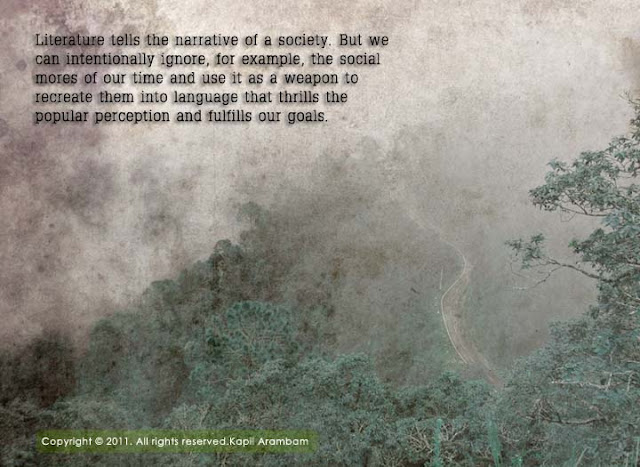Howling for a Radical Literary Landscape
Through other ways too, our test on self-identity can make it conspicuous, our true self. Even if we kill and murder, when nobody is watching at broad daylight — those examples set by the self-styled saviour of the land in planting bombs at crowded places, and in fake encounters: the favourite past time of the legally sanctioned gunmen called police and armies — we know inside us, we know them inside, who we are. Yet far from the madding crowds of useless politicos and foolish people who elect them, in a quiet ambience, literature offers a narration and an examination, free of real artificiality. Isn’t it ironical?
 |
| A lifetime is too short to wait for the favourable changes in a society |
We have a unique load on our frail shoulders, weakened by the mindless violence, debauchery and avarice all around. All of us become a poet when we are in love, but we need a lot more than that. People called it a legacy, a lived experience and what not, that is needed to carry forward for progress and posterity; and it weighs more in a conflict-torn society, like ours, to delve into the matters with unpretending eyes. This can provide insights into solution while documenting the nitty-gritty of the turbulent times — something which is noted with the hope that one day, we will live in peace and prosperity. So precisely, what we can do away with no reason, we can create and recreate a rich literary landscape that offers unaffectedly, a view of our time that tells of pain and pleasure, of hope and despair and so on. There are a lot of other reasons too.
We can create and recreate a rich literary
landscape that offers unaffectedly, a view
of our time that tells of pain and pleasure,
of hope and despair
A lifetime is too short to wait for the favourable changes in a society. But fortunately, we are the source of changes; and any sort of outcome, well, it also depends on our conviction and our readiness to accept or discard the things that we like or don’t like to see around us. Literature, here it may be noted, is considered as the superstructure, and there are several ways how we can improve upon it, independent of the base, albeit as noted above, it should be rendered to produce a swift change and capable of introducing new mindsets. There are several ways how we can develop such a literary landscape; the only problem lies in acceptation and execution. But that’s no issue as long as there is abundant creation and an awakening of consciousness, which are desperately lacking in our time.
Literature is a superstructure that should be rendered to
produce a swift change and capable
of introducing new mindsets
produce a swift change and capable
of introducing new mindsets
Colmer also suggests the forms, which he explained, are the best ones. “Some literary forms are especially suited to methods of indirect attack: satire, for example. From the time of the Greeks onwards, satirists have invented a variety of ways to maintain apparent detachment and the indirect approach, while pressing home their attack.”
Finally, Colmer wraps up with the three commonest forms: 1 The Beast Fable; 2 The Imaginary Journey; and 3 The Utopian Fantasy. He writes, “The beast fable has been used by the Greek dramatist Aristophanes in the Frogs, by Chaucer in the Nun’s Priest’s Tale, and by George Orwell in Animal Farm. Swift’s Gulliver’s Travels provides a model for the imaginary journey, while the history of literary utopias stretches — to take it no further — from More’s sixteenth-century Utopia, to Butler’s Erewhon (1872), Morris’s News From Nowhere (1891), and Huxley’s Brave New World (1932).
It is essential for the satirist’s purpose to shock us into seeing our own familiar world through unfamiliar eyes; some radical change of perspective is therefore absolutely necessary. Each of the three devices, the beast fable, the imaginary journey, and Utopian fantasy achieves this end,” he concludes.
 |
| Bloody Note: Know what exists and what we want to bring into existence |
Making reference to the old titles and the old authors brings us to the question of revivalism and radicalism, another wave that is sweeping across our time. The degree of undulation is open to question but we cannot deny the fact about it. But keeping aside all the knowledge and understanding, let’s just stick ourselves to one point: It’s bloody necessary to know what exists and what we want to bring into existence.
There are signs and signs everywhere, and it only depends on the creator how s/he engages the signs to make them a canvas to paint the truth
Literature tells the narrative of a society. But we can intentionally ignore, for example, the social mores of our time and use it as a weapon to recreate them into language that thrills the popular perception and fulfils our goals. There are signs and signs everywhere, and it only depends on the creator how s/he engages the signs to make them a canvas to paint the truth. As symbolists elaborate, we don’t even need a well-defined narrative to depict the freaking reality, but there are several ways we can use the subjects as a form of opposition, thereby changing the perceptions and attitudes for the better. And what can be a better example than the institution of countercultures that are built on the edifice of the Beat Generation?
Easier said than done. The speculation can continue unabated but the most important causal factor is the creation. Creation in abundance. Creation with resistance. Creation with quality and discipline. All the stories of humanity and all the stories of great civilisation are engraved in words. In our case, it is to narrate the stories of our time, to gain the consciousness, to tell the shared living experiences, to recreate the moments of happiness and joy that we have lost forever in bloodshed, decadence and nothingness. Only a few things are holy. This makes us howl for a radical literary landscape.
For LOUSY LITERATURE IN AN ALIEN LANGUAGE, 2011–2013
__________________________________________________________
What literature needs most to tell and investigate today
are humanity's basic fears: the fear of being left outside, and the fear of counting for nothing, and the feelings of worthlessness that come with such fears; the collective humiliations, vulnerabilities, slights, grievances, sensitivities, and imagined insults, and the nationalist boasts and inflations that are their next of kin ... Whenever I am confronted by such sentiments, and by the irrational, overstated language in which they are usually expressed, I know they touch on a darkness inside me. We have often witnessed peoples, societies and nations outside the Western world–and I can identify with them easily–succumbing to fears that sometimes lead them to commit stupidities, all because of their fears of humiliation and their sensitivities. I also know that in the West–a world with which I can identify with the same ease–nations and peoples taking an excessive pride in their wealth, and in their having brought us the Renaissance, the Enlightenment, and Modernism, have, from time to time, succumbed to a self-satisfaction that is almost as stupid.
__________________________________________________________
— Orhan Pamuk
Nobel Lecture (translation by Maureen Freely)
Text from Wikipedia
There are signs and signs everywhere, and it only depends on the creator how s/he engages the signs to make them a canvas to paint the truth
Literature tells the narrative of a society. But we can intentionally ignore, for example, the social mores of our time and use it as a weapon to recreate them into language that thrills the popular perception and fulfils our goals. There are signs and signs everywhere, and it only depends on the creator how s/he engages the signs to make them a canvas to paint the truth. As symbolists elaborate, we don’t even need a well-defined narrative to depict the freaking reality, but there are several ways we can use the subjects as a form of opposition, thereby changing the perceptions and attitudes for the better. And what can be a better example than the institution of countercultures that are built on the edifice of the Beat Generation?
Easier said than done. The speculation can continue unabated but the most important causal factor is the creation. Creation in abundance. Creation with resistance. Creation with quality and discipline. All the stories of humanity and all the stories of great civilisation are engraved in words. In our case, it is to narrate the stories of our time, to gain the consciousness, to tell the shared living experiences, to recreate the moments of happiness and joy that we have lost forever in bloodshed, decadence and nothingness. Only a few things are holy. This makes us howl for a radical literary landscape.
For LOUSY LITERATURE IN AN ALIEN LANGUAGE, 2011–2013
__________________________________________________________
What literature needs most to tell and investigate today
are humanity's basic fears: the fear of being left outside, and the fear of counting for nothing, and the feelings of worthlessness that come with such fears; the collective humiliations, vulnerabilities, slights, grievances, sensitivities, and imagined insults, and the nationalist boasts and inflations that are their next of kin ... Whenever I am confronted by such sentiments, and by the irrational, overstated language in which they are usually expressed, I know they touch on a darkness inside me. We have often witnessed peoples, societies and nations outside the Western world–and I can identify with them easily–succumbing to fears that sometimes lead them to commit stupidities, all because of their fears of humiliation and their sensitivities. I also know that in the West–a world with which I can identify with the same ease–nations and peoples taking an excessive pride in their wealth, and in their having brought us the Renaissance, the Enlightenment, and Modernism, have, from time to time, succumbed to a self-satisfaction that is almost as stupid.
__________________________________________________________
— Orhan Pamuk
Nobel Lecture (translation by Maureen Freely)
Text from Wikipedia







Comments
Post a Comment